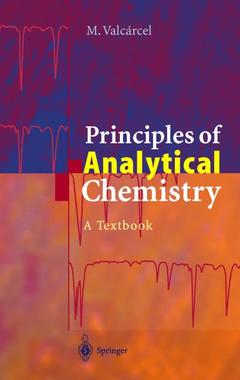Description
Principles of Analytical Chemistry, Softcover reprint of the original 1st ed. 2000
A Textbook
Author: Valcarcel Miguel
Language: English
Subjects for Principles of Analytical Chemistry:
Approximative price 52.74 €
In Print (Delivery period: 15 days).
Add to cart
Principles of Analytical Chemistry
Publication date: 08-2014
372 p. · 15.5x23.5 cm · Paperback
Publication date: 08-2014
372 p. · 15.5x23.5 cm · Paperback
Approximative price 52.74 €
Subject to availability at the publisher.
Add to cart
Principles of analytical chemistry, a textbook
Publication date: 08-2000
372 p. · 15.5x23.5 cm · Hardback
Publication date: 08-2000
372 p. · 15.5x23.5 cm · Hardback
Description
/li>Contents
/li>Comment
/li>
Principles of Analytical Chemistry gives readers a taste of what the field is all about. Using keywords of modern analytical chemistry, it constructs an overview of the discipline, accessible to readers pursuing different scientific and technical studies. In addition to the extremely easy-to-understand presentation, practical exercises, questions, and lessons expound a large number of examples.
Foreword by Prof. Gary Christian.- INTRODUCTION TO ANALYTICAL CHEMISTRY: Analytical Chemistry today.- Analytical chemical information.- Analytical chemical references.- Essential features of Analytical Chemistry: Basic elements; Fundamentals; Key words; Developments; Placement; Boundaries.- Evolution of Analytical Chemistry.- Conceptual and technical hierarchies.- Classifications.- Questions; Seminars; Suggested readings. ANALYTICAL PROPERTIES: Introduction.- The chemical metrological hierarchy: uncertainty and trueness.- Errors in Analytical Chemistry.- Capital analytical properties: Accuracy; Representativeness.- Basic analytical properties:Precision; Sensivity; Selectivity.- Accessory analytical properties: Expeditiousness; Cost-effectiveness; Personnel-related factors.- Relationships among analytical properties: Hierarchical relationships; Foundation relationships; Contradictory relationships; Complementary relationships.- Other analytical properties.- Questions; Seminars: Numerical problems; Suggested readings. TRACEABILITY: REFERENCE MATERIALS: Introduction.- The integral concept of traceability.- Physical and chemical traceability.- Types of standards and their traceability.- Analytical chemical standards: Types; General properties; Preparation and storage; Uses.- Specific meanings of traceability: Traceability of analytical result; Traceability of a sample (aliquot); Traceability of an instrument; Traceability of a sample standard; Traceability of a method; Relationships among traceability meanings.- Questions; Seminars; Suggested readings. THE MEASUREMENT PROCESS IN CHEMISTRY: Definition of chemical measurement process.- General steps of a chemical measurement process.- Preliminary operations: General features; Sub-steps; Sample collection; Sample treatment.- Measurement and transducing of the analytical signal.- Signal acquisition and data processing.- Validation of a chemical measurement process.- Salient current trends.- Annexes I -VI.- Questions; Seminars; Suggested readings. QUALITATIVE ASPECTS OF ANALYTICAL CHEMISTRY: Introduction.- The binary response: Types of binary response; Quantitative connotations; Analytical features; Errors:false positives and false negatives.- Types of qualitative identification.- Standards and calibration in qualitative analysis.- Classical qualitative analysis: General notions; Types of reagents; Analytical schemes; Instrumental qualitative analysis: General notions; Static systems; Dynamic systems.- Questions; Seminars; Suggested readings. QUANTITATIVE ASPECTS OF ANALYTICAL CHEMISTRY: Fundamentals: Introduction; Analytical properties; Equipment and method calibration; Classical and instrumental quantitative analysis; Quantitation methodologies; Expressing quantitative results.- Calculable quantitation methods: Absolute methods involving no analytical standard; Absolute methods involving analytical standards.- Relative quantitation methods: Interpolation and extrapolation methods; Comparative methods.- Questions; Seminars; Suggested readings. THE ANALYTICAL PROBLEM: Introduction.- Meanings of 'problem' in Analytical Chemistry.- Integral definition of analytical problem.- Elements of the analytical problem.- Steps of the analytical problem-solving process: Identifying and confirming the information required; Pinpointing the analytical information required; Planning the analytical approach; Monitoring the results; Implementing corrective actions.- Consistency between required information and supplied information.- The analytical problem in the context of quality.- Questions; Seminars; Suggested readings. ANALYTICAL CHEMISTRY AND QUALITY: Introduction.- A generic approach to quality: Integral definition of quality; Types of quality; Quality compromises; Structure of quality; Benefits of quality.- General aspects of quality in Analytical Chemistry: Types of quality in Analytical Chemistry; Quality and analytical properties; Quality and the an
Innovative approach to teaching Analytical Chemistry to undergraduates
Contains 100 specific examples, 450 questions for students, and 27 seminars
Includes supplementary material: sn.pub/extras
© 2024 LAVOISIER S.A.S.
These books may interest you

Capillary Gel Electrophoresis 155.28 €



